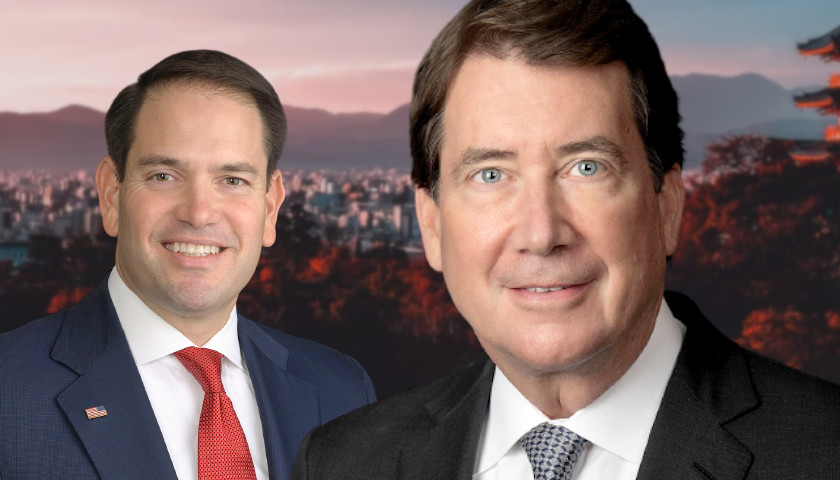Tennessee Republican Senator Bill Hagerty announced on Thursday that he and his Florida Republican colleague Marco Rubio wrote to Secretary of Defense Lloyd Austin this week expressing alarm at the removal of America’s F-15-jet fleet from Okinawa, Japan.
The United States Air Force last week publicized its intention to phase out the fleet’s presence at Kadena Air Base on the southeastern Japanese island starting on November 1. The two squadrons now being withdrawn comprise half of the roughly 100 fighter aircraft the United States currently maintains in Japan. Instead of replacing the jets, the Biden administration anticipates periodically sending F-22 planes from Alaska to the base.
Hagerty served as U.S. ambassador to Japan under President Donald Trump and has advocated for strengthening the U.S.-Japan alliance in his two years so far as a member of the Senate Foreign Relations Committee. He and Rubio, a senior member of that committee, raised concern that the Department of Defense’s decision on the F-15 Eagles will weaken America’s ability to inhibit Communist China’s hegemonic ambitions, particularly regarding Taiwan.
“We are concerned that DoD’s decision sends the wrong signal, not only to the [Chinese Communist Party (CCP)] but also to our allies and partners in the Indo-Pacific,” the senators, along with Congressmen Michael McCaul (R-TX-10) and Mike Gallagher (R-WI-8), wrote to Austin. “We therefore request a Congressional briefing on DoD’s actions articulating specific steps to replace the deterrent value and combat capability of any assets removed from the Indo-Pacific region, as well as the administration’s plan to establish a force posture in the Indo-Pacific that would be resilient to a CCP attack and capable of deterring an invasion of Taiwan.”
In public remarks on Tuesday, the Defense Department Press Secretary and Brigadier General Patrick Ryder characterized the new rotational deployments of F-22s as “a steady presence” for the U.S. at Kadena. He also emphasized the Biden administration’s assertion that retiring the more than 30-year-old fleet serves the purpose of Air Force modernization.
“The U.S. commitment to Japan and regional security and the defense of Japan remains ironclad,” he said. The department did not provide further comment for The Tennessee Star about any response to the lawmakers’ letter.
While Hagerty and his colleagues indicated they sympathize with the aim of modernizing America’s air-combat capabilities to address the threat posed by China’s military, they suggested the fleet phaseout belies that goal insofar as no permanent replacement is planned. The Defense Department even said last week it “has not made a decision on the long-term solution” to the removal of the F-15s.
John Rossomando, a defense and national security expert for Newsmax, The Epoch Times and One America News Network echoed the legislators’ concerns.
“I think it’s a disaster because it removes another capability that we use to deter China,” he told The Star. “President Biden, going back to his time as senator from Delaware at the height of the Cold War, never understood deterrence.”
Rossomando noted that, while Japan does have its own F-15s and other defenses, neither the island nation nor any other ally in the region can match America’s air-combat proficiency. He added that merely sending planes on a rotational basis would lessen America’s readiness to respond if China made incursions into disputed territories.
“To remove these F-15s without replacing them with something else is completely irresponsible,” he said. “You need to have the assets in place on day zero. When the Chinese decide to do something, you’d have to send F-22s from Alaska — which is a long haul from the Diaoyu Islands or from China.”
Rossomando said this decision is the latest in a string of poor choices President Joe Biden has made regarding America’s defense posture. He cited the president’s cancellation last month of the nuclear sea-launched cruise missile program, which the previous administration pursued as a deterrent against Chinese and Russian tactical nuclear weapons.
“It’s another example of how the Biden Administration doesn’t think,” he lamented. “If you talk to anybody who has been in a top position in the Pentagon in the past who knows a thing or two about strategy, they’ll tell you this is nuts.”
– – –
Bradley Vasoli is a reporter at The Tennessee Star. Follow Brad on Twitter at @BVasoli. Email tips to [email protected].








